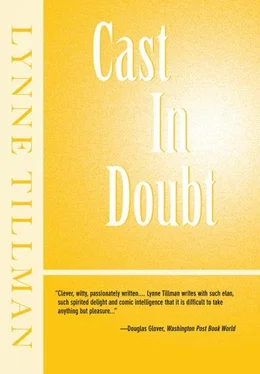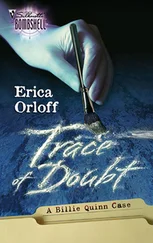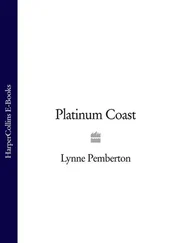The hotel is divided, cast equally in sun and shade, appropriately enough, I reflect. Nectaria greets me — Yá sou, Horace — and I greet her and take the mail.
Where is Yannis? There Helen is, on her sun deck — she says Greece is like southern California. I’ve never been. Her head is down; she is reading a book, and just now she glances behind her, and I see a form in the doorway to the terrace, a male form. It looks like Yannis from here, but that’s mad. Besides, the figure is taller, more like John, though that too is mad as John is in the hospital. When Yannis appears here moments later, I am assured that I am crazy, driven by paranoia, the fate of homosexuals, wrote Freud, driven to bizarre conjurings and hallucinations, to flee the face of the true loved one. Alicia could be right about Helen, of course; it is within the realm of possibility. Helen might be cruel, sadistic in the extreme. Amoral. But it is not probable. I am not paranoid about her. In any case I don’t subscribe to Freud’s theory about paranoia. Doubt is doubt, as a cigar is just a good smoke. Helen waves to me suddenly; I’d forgotten I was staring in her direction. She draws circles around her eyes with her fingers. A movie tonight? Why not.
Why not? Because I ought to be working, getting on with the crime novel. A simple story: a rich boy murders his mother and father. It is based on a case that occurred not far from where I grew up. I knew boys like him. I might have been a boy like him, if we’d been even richer and I’d been more aggressive, even more perverse than I am. The rich boy evades the law — he has an alibi — until the canny, sarcastic detective, Stan Green, discovers evidence that the boy thought he’d destroyed. But he hadn’t, otherwise there’d be no story for me to tell.
Much of it is written, and some parts I am rewriting, but lately I am filled with such ennui, I wonder why go on, why bother — and my novel, Household Gods, awaits, petulantly, in a special box, one I’ve had since college, with a drawing of a rat in the style of Michelangelo on its cover. A cloud shoots across the sun and covers it; the sky darkens and with it my mood. Just like that, just as if I were a Manichaean or some such dualist. Why does one have to do anything, especially if one is, as I am, relatively well off, especially here. Might I not just while away my short time on this mundane stage rather than engage in the drama of creation? Blow it out your asshole! Roger’s crude phrase echoes heartlessly. I laugh aloud anyway. Yannis glances at me quizzically. Roger’s right occasionally, right on the money, as they say, even if he doesn’t have any money, another one of those things that makes our friendship tense.
It’s 5:30 P.M., and where has time gone; the day is gone. I must have been with Alicia for over an hour and have been sitting here for an hour or more, staring into space and toward the harbor and then gazing inward, inward staring, navel gazing, my father called it. There is a word for that, Greek, of course, which has come into English: omphaloskepsis, or meditating while staring at one’s navel. Marvelous, isn’t it. I love words. I shuffle across the floor, slap after-shave on my puffy face, ask Yannis whether he wants to join us, and leave without him, running, not exactly, to the spot where Helen and I always meet.
She is punctual, which I find disarming in a young person. She is even waiting for me, sitting on the curb and reading a book. As I approach she closes it and pats it, as if saying good-bye or, more likely, adieu. She takes my arm and without a word, except Hello, we walk toward the outdoor cinema to see an old Clint Eastwood movie, The Good, the Bad and the Ugly —it’s been here many times before, but it’s always such a pleasure. I’m very glad the Italians took up the Western when we’d let it drop, which was as it should be, given the history it covered over or distorted. But still, and I hate to admit it, I love those early Westerns, with their picturing of the bold and brave crossing the old frontier. I can feel my breath nearly stop when all the wagons line up next to each other, or behind each other, ready for the shout — Westward Ho! — that starts the dangerous journey. And I know all of this is wrong to feel-there is such juvenile pride in these feelings — and the West couldn’t possibly have looked the way it did in the movies; and Turner’s frontier thesis was incorrect anyway. But for a movie, it’s breathtaking — the screen filled with women in bonnets and men in rawhide. I suppose rawhide gives off a horrible odor. The Italians don’t go in much for wagons in circles. But those close-ups! Clint Eastwood is not my type at all, though I like his squinting in the sun and chewing on a stogie. The lines at the corners of his eyes are deep as burrows in the ground and I think of Alicia and the thin, scratchy lines about her eyes, her dark, penetrating eyes.
Helen’s knees are clasped to her chest; she’s like a human ball, curled up into herself. Of course mental patients do that too, and rock back and forth. Perhaps her uterus hurts her. Oh hush, Horace, I say to myself. Shut up. The movie’s so exaggerated, the actors, their gestures and expressions, the divide between the good and the bad, the music so grand and wonderful, that after a while I do forget the lines around Alicia’s eyes and my questions about Helen and John. It’s a long movie, and time will stretch and stretch here. I feel happy. I take Helen’s hand and squeeze it. She looks at me furtively; I realize she’s crying. Tears are most definitely in her eyes, but could they be there for any of the characters on the screen? It seems unlikely. I hand her my handkerchief and she takes it with a small laugh, so she must be all right. Nevertheless she does wipe her eyes and, I might add, blow her nose. It’s possible she’s allergic to the weeds here, to something in the air.
The Greeks are swinging their worry beads full force now. I tried them when I was first here but discovered that I am in no way the sort to be able to go native. I felt completely ridiculous. Helen is not the type, either, which relieves me.
As we walk out of the theater, several men make quite a show of watching her bottom — her ass — and I pretend not to notice them. But Helen turns on her heel and in Greek tells them to fuck off. They are as astonished as I am. My Smitty, my Helen, is full of surprises. She has yet to disappoint me in any important way and if she’s now being crude, it is her right, for, I ask myself, why should she let those men devour her with their greedy eyes and make rude comments? Yet the speed and harshness of her attack is a shock. Helen takes my arm and we walk back to the harbor.
These are the only Westerns she likes, she tells me, she can’t sit through the others; they’re too straight. Instantly I feel a twinge of sadness, even futility, at this blatant expression of the gap between us; the sadness settles just below my breastbone or in my solar plexus where anguish resides, I think. Certainly I can’t adequately explain to her my nostalgia for the older American ones, mendacious as they are. She’d be mystified and out of sympathy with me, though I’m sure she’d listen attentively and without malice. Helen doesn’t make fun of me. Were I to express myself, she’d respect my opinion and be very interested, intrigued at how differently I thought from her. Still, I’m embarrassed, as if mentally enfeebled, hobbled for a moment by age; I am determined not to let that show. Jovially, I invite her to dinner. But no, she won’t join me. And no, I can’t find the words to ask her about John, and besides I’m not supposed to. She expects she will encounter the Gypsy and intends to speak to her soon, maybe tomorrow. But will she visit John, I wonder, but I don’t dare ask. Helen says she may travel, take a short trip, for a few days perhaps. Each of us — Alicia, Roger, Helen — comes and goes. We often do not see each other for days; but we do not monitor each other’s movements. There is a way in which time is not of the essence here. It is a luxury each of us cherishes.
Читать дальше












